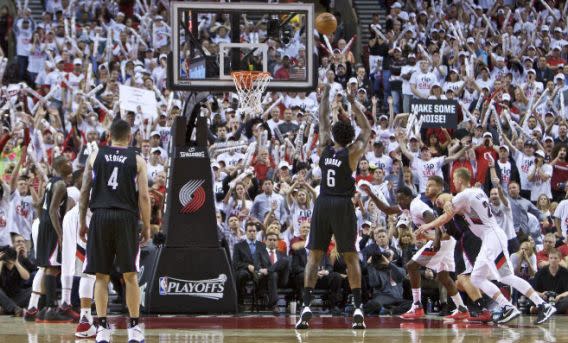The NBA's new anti-Hack-a-Shaq rules are a clear compromise

Concerns over so-called Hack-a-Shaq intentional fouling tactics ballooned during the 2015-16 NBA season, with commissioner Adam Silver and other prominent league figures calling for reform. Complaints about those intentional fouls cover a number of factors, with most of the best arguments focusing on what they do to the league’s watchability. No matter the claim, though, it seemed fairly certain that the league would devise some plan to limit the fouls this offseason.
[Follow Dunks Don’t Lie on Tumblr: The best slams from all of basketball]
The NBA’s Board of Governors announced Tuesday that it has unanimously approved three rule changes in reaction to Hack-a-Shaq tactics. However, they can best be described as moves to limit these fouls, not to eradicate them. From the league’s press release:
“In looking at the data and numerous potential solutions to combat the large increase in deliberate away-from-the-play foul situations, we believe these steps offer the most measured approach,” said Kiki VanDeWeghe, NBA Executive Vice President, Basketball Operations. “The introduction of these new rules is designed to curb the increase in such fouls without eliminating the strategy entirely.”
Rules changes relating to deliberate away-from-the-play foul rules:
* The current rule for away-from-the-play fouls applicable to the last two minutes of the fourth period (and last two minutes of any overtime) — pursuant to which the fouled team is awarded one free throw and retains possession of the ball — will be extended to the last two minutes of each period.
* For inbounds situations, a defensive foul at any point during the game that occurs before the ball is released by the inbounder (including a “legitimate” or “natural” basketball action such as a defender fighting through a screen) will be administered in the same fashion as an away-from-the-play foul committed during the last two minutes of any period (i.e., one free throw and possession of the ball).
* The flagrant foul rules will be used to protect against any dangerous or excessively hard deliberate fouls. In particular, it will presumptively be considered a flagrant foul if a player jumps on an opponent’s back to commit a deliberate foul. Previously, these type of fouls were subject to being called flagrant but were not automatic.
The rule changes are different enough to require individual analysis, so let’s do that right now.
The first change would figure to be the most effective and far-reaching of the bunch. Fouled players will now get two free throw and the ball on any away-from-the-play foul in the final two minutes of each quarter, which creates six extra minutes per game in which Hack-a-Shaq provides no advantage at all. Many fans would have liked to see this rule extended to the entire game, but it’s not meaningless that one-sixth of all NBA games will now feature no intentional fouls of terrible free-throw shooters.
The second change will curb some intentional fouls, or at least require teams to gesture towards playing defense before grabbing bad shooters. But it could have a greater effect on inbound defense as a whole, especially in late-game situations where defenders often claw and grab at opponents.
The third and last change is undoubtedly a matter of optics. Last season, players began to jump on each other’s backs during free throws as a way of intentionally fouling in the final two minutes while still ostensibly remaining in the play. The NBA asked its referees to consider these fouls as potential flagrants once the move became somewhat popular, but this change effectively demands it be called as such. This type of foul does not happen very often, but it looks stupid enough to bring shame upon the league.
These rules will almost certainly not stop Hack-a-Shaq tactics. Players will still be able to foul in this manner for 10 minutes of every quarter, and it figures that any coach who likes to employ the move will continue to go to it when they have no other way to stop an offense or disrupt the flow of the game.
Nevertheless, even the most vociferous opponents of Hack-a-Shaq should see these changes as moves in the right direction. These new rules look like compromises, but incremental changes are better than nothing when a substantial portion of the league still doesn’t think Hack-a-Shaq is a big problem. The majority of these fouls are targeted at three players — Dwight Howard, DeAndre Jordan, and Andre Drummond — but total instances were way up in 2015-16. If the numbers continue to rise even after these changes, it’s safe to bet that Silver and the competition committee will try to extend the no-foul period past the final two minutes or enact new rules altogether.
– – – – – – –
Eric Freeman is a writer for Ball Don’t Lie on Yahoo Sports. Have a tip? Email him at efreeman_ysports@yahoo.com or follow him on Twitter!

